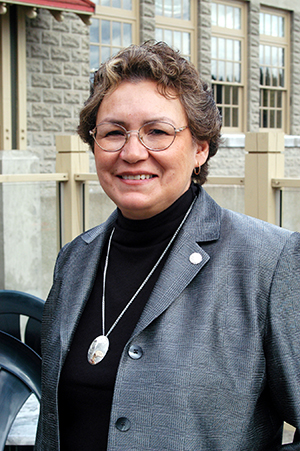
The chief commissioner of the British Columbia Treaty Commission, Sophie Pierre, provided the province's Oct. 6 throne speech as an example of the kind of thinking that needs to change.
"In yesterday's throne speech ... there was one piece we thought was very interesting," she said while presenting the commission's annual update. "In the throne speech they said leadership means developing a real partnership with First Nations and giving them the opportunity to participate meaningfully in a thriving economy."
That idea of "giving" First Nations the opportunity needs to be updated, she said. "We recommend as a commission that it should also mean it is about giving businesses the opportunity to participate meaningfully with First Nations on First Nations' title lands. That is the reality. That is tomorrow's reality."
Citing the Tsilhqot'in decision that recognized Aboriginal title, continuation of the courts' direction in recent decades, she added, "It is no more just First Nations kind of second thought. We're front and centre now."
The commission also drew attention to the problem of overlapping traditional territories and recommended that First nations receive support to resolve those issues among themselves.
In some cases overlapping claims have stalled progress towards treaties, said Pierre.
'Exit strategy' needed for some
Pierre said there needs to be an "exit strategy" for those tables and others that are unlikely to reach final agreements, some of which have been negotiating for decades. "There are some First Nations that have been at the table for the whole time, but we can see it's just going anywhere," she said. "They're just spinning their wheels."
The government tends to respond by sending negotiators with no mandate to close any kind of deal and to pretend progress is happening, she said. "There are some tables where everybody knows you're not going to end up with a treaty here. There has to be an exit strategy. An exit strategy has to start with loan forgiveness."
The standard funding to participate in negotiations includes 20 per cent contributed from the provincial and federal governments and 80 per cent that is debt to those governments and required to be paid back, according to the commission's report.
First Nations came to the table in good faith, hoping to reach a treaty, Pierre said. If it's not happening, it's unfair to leave them burdened with the debt, she said. "They can't move ahead on economic development if they're carrying this major debt."
Pierre declined to say which negotiations she has in mind, but said the debts are significant. "The money has reached the point where whatever payment they're going to receive as part of a treaty is going to be wiped out."
Province will talk with partners: Minister
Jerry Lampert, a federal government representative on the BCTC, said final agreements typically include capital transfers, out of which First Nations pay back the debt from the negotiation process.
"The problem is some First Nations are getting close to final agreement and the amount of the capital transfer on the table so far is equal to the debt, so they'd be left with nothing in terms of ongoing contribution to what they want to do," he said.
"The issue of debt and the treaty funding is a tripartite issue, so it's not one that unilaterally one party is going to be able to make a decision about," said John Rustad, the minister of Aboriginal Relations and Reconciliation.
Asked if the province is open to forgiving the debts some First Nations have from the process, Rustad said that would have to be discussed with the federal government and the treaty commission. "Those are discussions that we will have to have with them and it would be inappropriate for the province to take a position without first being in consultation and in coordination with the other partners."
He said progress is being made through the treaty process. "Obviously the treaty process is a very long process," he said. "I think all of us would like to see that process move forward faster. Treaty is the best form of reconciliation we can reach." ![]()
Read more: Indigenous, BC Politics















Tyee Commenting Guidelines
Comments that violate guidelines risk being deleted, and violations may result in a temporary or permanent user ban. Maintain the spirit of good conversation to stay in the discussion.
*Please note The Tyee is not a forum for spreading misinformation about COVID-19, denying its existence or minimizing its risk to public health.
Do:
Do not: